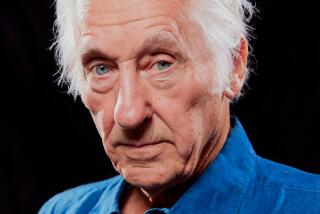Ellen Meloy, 58; Essayist Wrote About Nature, the Southwest
- Share via
Ellen Meloy, a naturalist and a nonfiction author whose 2002 book “The Anthropology of Turquoise: Meditations on Landscape, Art and Spirit” was nominated for a Pulitzer Prize last year, has died. She was 58.
Meloy died Nov. 4 at home in the small town of Bluff, Utah.
The cause was not certain, but it appeared to have been a heart attack or an aneurysm, Meloy’s brother, Mark Ditz- ler, said.
An avid hiker, gardener and river rafter, Meloy was not known to have been in poor health, according to friends.
“The literary community of Utah is in shock,” said Guy Lebeda, literature coordinator for the Utah Arts Council in Salt Lake City.
“Ellen was very well-known in the state,” he added.
Her essays called attention to the beauty of her state, even for longtime residents, Lebeda said. “On a simple walk along a riverbank with Ellen, she’d pick up things none of the rest of us got. She was like a poet in that way.”
In her three highly regarded collections of essays, Meloy used the Southwest as the setting and subject for what she referred to as “land-based literature.”
“Raven’s Exile: A Season on the Green River” (1994) recounts her experiences traveling the river through Utah, Colorado and Wyoming. She explored it with her husband, Mark, a ranger with the U.S. Bureau of Land Management who patrolled the river for a time. The idea for the book came after she saw Desolation Canyon in eastern Utah as part of that trip.
“I had written a lot of notes on that beautiful and very wild canyon,” she told the Deseret News in Salt Lake City in 2000. “My husband and I took a series of river trips, with lots of quiet time to observe.”
“Raven’s Exile” won the Whiting Foundation Writer’s Award as well as the Spur Award, presented by the Western Writers of America.
Meloy’s second collection, “The Last Cheater’s Waltz: Beauty and Violence in the Desert Southwest,” was published five years later.
It began as a reflection on the history of the land and inhabitants of the Colorado Plateau and included an essay about building the house where she and her husband lived on eight acres near the San Juan River.
The book also examined the deadening effect nuclear testing and the atomic bomb had on the New Mexico desert.
“Los Alamos and its industrial complex sit atop narrow fingers of land separated by deep canyons,” she wrote, pointing out the beauty of the area in contrast to the bomb that was developed there in the 1940s.
That contrast of natural beauty and destructive human urges triggered the theme of the book, she later said.
“The most serene places in the Southwest are also the most egregious places in human history,” Meloy said in a 1999 interview with the Albuquerque Journal. Writing about it allowed her to “explore that paradox,” she said.
Meloy’s most recent book, “The Anthropology of Turquoise,” follows her travels from Sequoia in California to the Bahamas and the Yucatan Peninsula in Mexico. Of Mexico’s lush landscape of green vegetation, she wrote that it stretched “far into the horizon like giant broccoli gone berserk.”
Perhaps the best-known essay in the collection, “Swimming the Mojave,” recounts Meloy’s road trip from Los Angeles to Colorado and the motel pools where she swam. It was her playful revenge for the family vacations of her childhood. Her parents always seemed to choose the one motel in town without a pool.
Born in Pasadena, she moved with her family to London, where she graduated from high school. She returned to the U.S. and graduated from Goucher College in Maryland and earned a master’s degree in environmental studies at the University of Montana in Missoula. She and her husband moved to Utah in 1989.
A self-taught writer, Meloy published some of her first essays in literary journals. As her reputation grew, she became a frequent contributor to Utah Public Radio. She taught at writers’ workshops, including one that combined writing and a riverboat trip in Utah.
Meloy is survived by her husband, parents and two brothers.
More to Read
Sign up for our Book Club newsletter
Get the latest news, events and more from the Los Angeles Times Book Club, and help us get L.A. reading and talking.
You may occasionally receive promotional content from the Los Angeles Times.










